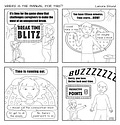When Lenore Eklund, our fabulous Medical Motherhood editorial cartoonist, sent over this month’s edition of Where is the Manual for This?! I literally laughed out loud. I feel this HARD. My to do list is as long as my arm and somehow even when I get a surprise break I still don’t know what to do with myself. The tension between “rest” and “productivity” is particularly strong. Productivity usually wins but rest would sure be nice…
What do you do when you get a surprise break? What do you want to do? Let us know in the comments or reply to this email if you are a subscriber.
The second Sunday of every month Medical Motherhood publishes Where Is the Manual for This?!, an editorial cartoon by Lenore Eklund. If you feel like we just had one: you’re right! Due to publication schedules on a couple of freelance pieces, March’s edition was published just a couple weeks ago.
Medical Motherhood’s news round up
Summaries of news and opinion from outlets around the world. Click the links for the full story.
I’m trying something new this week: Brief summaries of these news stories on disabled children and their families, rather than quotes from the piece. There are pros and cons to this, but I’m hopeful that the summaries will be more useful. As always, you can click the headline to access the full piece. What do you think? Do you like this better or should I go back to the snippets? Write to me by replying to the email if you are a subscriber, or leave a comment.
• From the Oregon Capital Chronicle: “Proposal on paying parent caregivers of children with highest disability needs advances”
Oregon state lawmakers are considering a proposal to pay parents of children with the highest medical and behavioral health needs to care for them. Senate Bill 91 allocates $3 million in state funds over the next two years, which is less than what other proposals that would have included more children would cost. The bill would provide a limited option to the parents who have been advocating for such legislation for more than two years. The program would be funded in part by Medicaid and needs approval from the federal Centers for Medicare & Medicaid Services. The total discretionary budget for all state programs this year is about $325 million, not nearly enough for state Democrats’ top priorities.
Human Services Committee chair Sara Gelser Blouin of Corvallis proposed the scaled-down version of the bill over financial concerns, and she won the support of all of the committee members. However, the proposal's limited scope has received mixed responses from parent caregivers and advocates. Senate Minority Leader Tim Knopp of Bend had proposed a similar bill that would have covered all children with in-home support hours but that was allowed to die in committee due to budget concerns. The lawmakers said they hope to expand the program when the revenue forecast is brighter.
• From Florida Politics: “House approves new path for parental oversight of adult children with disabilities”
Florida's House of Representatives has unanimously approved a bill, HB 19, which allows parents of adult children with disabilities to remain involved in their child's education without the need for guardianship.
“With your vote today, you will stop an expensive and stressful rush to guardianship by parents of disabled students across our state just so they can sign a permission slip or just so they can know when their loved one is off campus,” said Democratic Rep. Allison Tant of Tallahassee, who filed the measure as a result of her own experience with an adult son with complex disabilities.
Students with disabilities can continue in public schools until they are 22 years old, but when they turn 18, their parents no longer have an automatic right to sit in on teacher conferences or decision-making meetings. As a result, parents have had to resort to gaining guardianship, which is costly and complicated. The new bill would inform the student with an individual education plan a year before they turn 18 what this means and work with their education providers to create a channel for parents to remain informed about educational matters. The Florida Senate is expected to pass the bill as it has already received two Senate committee approvals.
• From University of California-Riverside: “One of every six autistic children are expelled from daycare”
According to a study conducted by the University of California, Riverside, roughly one in six autistic children are expelled from preschool programs, with the average age of rejected children being only 3.3 years old.
The research paper, “Preschool and Child-Care Expulsion: Is it Elevated for Autistic Children?,” was published in the journal Exceptional Children.
The consequences of expulsions for these children are chilling, as they face more conflict with and dependency on their teachers when they enter kindergarten, among other difficulties. Autism characteristics, including difficulty with social communication and some repetitive behaviors, can be misinterpreted as misbehavior, making autistic children more vulnerable to expulsions. The study found that teachers may miss children’s non-verbal attempts to communicate their needs, which heightens children’s anxiety and can result in temper tantrums at such a young age.
The study’s authors are seeking additional funding for their Smooth Sailing interventions to be adopted by preschool and early childhood educators. These are aimed at forging better relationships between autistic students and their teachers.
“Kids who have good relationships with their teachers in early childhood settings do better academically, socially, and emotionally,” said Jan Blacher, the study’s lead author. “They are less likely to be asked to leave school, and in high school, they are more likely to get better grades and graduate.”
Medical Motherhood brings you quality news and information each Sunday for raising disabled and neurodivergent children. Get it delivered to your inbox each week or give a gift subscription. Subscriptions are free, with optional tiers of support. Thank you to our paid subscribers!
Follow Medical Motherhood on Facebook, Twitter, TikTok, Instagram or Pinterest. The podcast is also available in your feeds on Spotify and Apple Podcasts. Visit the Medical Motherhood merchandise store.
Do you have a story to share or an injustice that needs investigation? Tell me about it and it may become a future issue.
















Caregiver's Break Time Blitz: The eternal struggle between productivity and rest